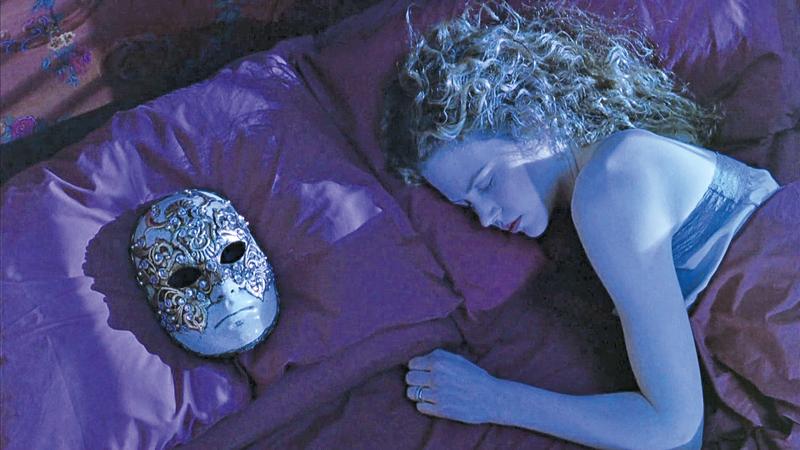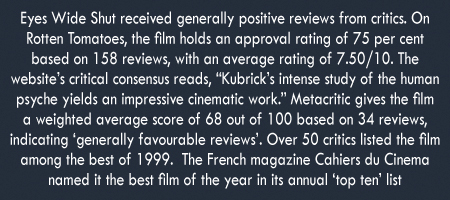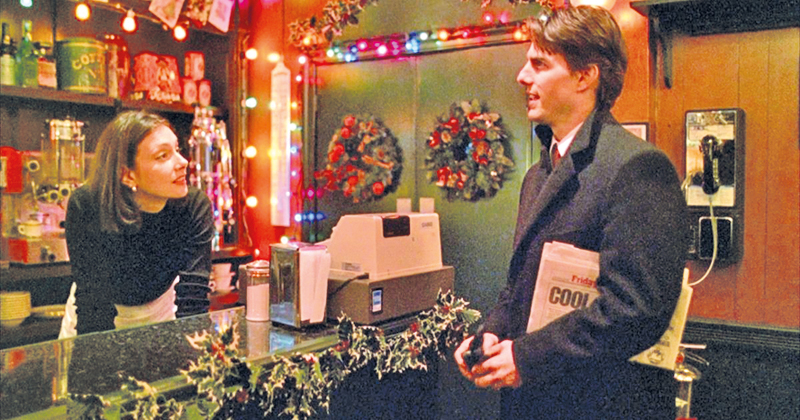
Eyes Wide Shut is a 1999 erotic mystery psychological drama film directed, produced and co-written by Stanley Kubrick. Based on the 1926 novella Traumnovelle (Dream Story) by Arthur Schnitzler, the movie transfers the story from early 20th-century Vienna to the 1990s New York City. The film follows the sexually charged adventures of Dr. Bill Harford, who is shocked when his wife, Alice, reveals that she had contemplated having an affair a year earlier. He then embarks on a night-long adventure, during which he infiltrates a massive masked orgy of an unnamed secret society.
Kubrick obtained the filming rights for Dream Story in the 1960s, considering it a perfect text for a film adaptation about sexual relations. He revived the project in the 1990s when he hired writer Frederic Raphael to help him with the adaptation. The film, which was mostly shot in the United Kingdom, apart from some exterior establishing shots, includes a detailed recreation of exterior Greenwich Village street scenes made at Pinewood Studios. The film’s production, at 400 days, holds the Guinness World Record for the longest continuous film shoot.
Kubrick died six days after showing his final cut to Warner Bros. Pictures, making this the final film he directed. In order to ensure a theatrical R rating in the United States, Warner Bros. digitally altered several sexually explicit scenes during post-production. This version was released on July 16, 1999, to moderately positive reactions from film critics. Box office receipts for the film worldwide were about $162 million. The uncut version has since been released in DVD, HD DVD and Blu-ray Disc formats.
Adaptation
 Arthur Schnitzler’s 1926 novella Dream Story is set around Vienna after the turn of the century. The main characters are a couple named Fridolin and Albertina. The couple’s home is a typical suburban middle-class home. Like the protagonist of the novel, Schnitzler was Jewish, lived in Vienna, and was a medical doctor, although he left medicine to write.
Arthur Schnitzler’s 1926 novella Dream Story is set around Vienna after the turn of the century. The main characters are a couple named Fridolin and Albertina. The couple’s home is a typical suburban middle-class home. Like the protagonist of the novel, Schnitzler was Jewish, lived in Vienna, and was a medical doctor, although he left medicine to write.
Kubrick frequently removed references to the Jewishness of characters in the novels he adapted. In Eyes Wide Shut, Frederic Raphael, who is Jewish, wanted to keep the Jewish background of the protagonists, but Kubrick disagreed and removed details that would identify characters as Jewish. Kubrick determined Bill should be a ‘Harrison Ford-ish goy’ and created the surname of Harford as an allusion to the actor. In the film, Bill is taunted with homophobic slurs. In the novella, the taunters are members of an anti-Semitic college fraternity. In an introduction to a Penguin Classics edition of Dream Story, Raphael wrote that “Fridolin is not declared to be a Jew, but his feelings of cowardice, for failing to challenge his aggressor, echo the uneasiness of Austrian Jews in the face of Gentile provocation.”
The novella is set during the Carnival, when people often wear masks to parties. The party that both husband and wife attend at the opening of the story is a Carnival Masquerade ball, whereas the film’s story begins at Christmas time.
In the novella, the party (which is sparsely attended) uses ‘Denmark’ as the password for entrance; that is significant in that Albertina had her infatuation with her soldier in Denmark; the film’s password is ‘Fidelio’. In early drafts of the screenplay, the password was ‘Fidelio Rainbow’ Jonathan Rosenbaum noted that both passwords echo elements of one member of the couple’s behaviour, though in opposite ways. The party in the novella consists mostly of nude ballroom dancing.
In the novella, the woman who ‘redeems’ Fridolin at the party, saving him from punishment, is costumed as a nun, and most of the characters at the party are dressed as nuns or monks; Fridolin himself used a monk;’ costume. This aspect was retained in the film’s original screenplay, but was deleted in the filmed version.
The novella makes it clear that Fridolin at this point hates Albertina more than ever, thinking they are now lying together like ;mortal enemies’. It has been argued that the dramatic climax of the novella is actually Albertina’s dream, and the film has shifted the focus to Bill’s visit to the secret society’s orgy, whose content is more shocking in the film.
The adaptation created a character with no counterpart in the novella: Ziegler, who represents both the high wealth and prestige to which Bill Harford aspires, and a connection between Bill’s two worlds (his regular life, and the secret society organising the ball). Critic Randy Rasmussen interprets Ziegler as representing Bill’s worst self, much as in other Kubrick films; the title character in Dr. Strange love represents the worst of the American national security establishment, Charles Grady represents the worst of Jack Torrance in The Shining, and Clare Quilty represents the worst of Humbert Humbert in Lolita.
More significantly, in the film, Ziegler gives a commentary on the whole story to Bill, including an explanation that the party incident, where Bill is apprehended, threatened, and ultimately redeemed by the woman’s sacrifice, was staged. Whether this is to be believed or not, it is an exposition of Ziegler’s view of the ways of the world as a member of the power elite.
Reception
Eyes Wide Shut received generally positive reviews from critics. On Rotten Tomatoes, the film holds an approval rating of 75 per cent based on 158 reviews, with an average rating of 7.50/10. The website’s critical consensus reads, “Kubrick’s intense study of the human psyche yields an impressive cinematic work.” Metacritic gives the film a weighted average score of 68 out of 100 based on 34 reviews, indicating ‘generally favourable reviews’. Over 50 critics listed the film among the best of 1999. The French magazine Cahiers du Cinema named it the best film of the year in its annual ‘top ten’ list.

